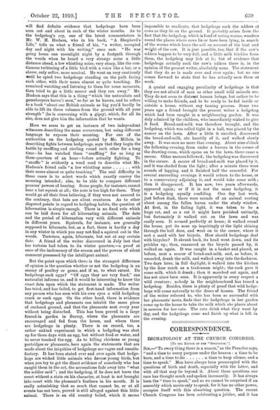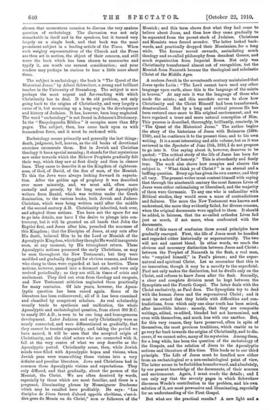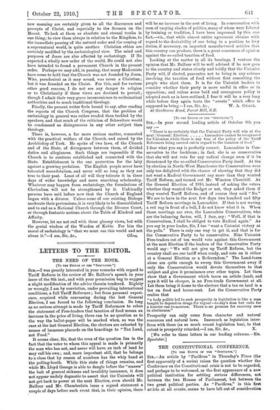CORRESPONDENCE.
ESCHATOLOGY AT THE CHURCH CONGRESS.
[TO THE EDITOR Or THE "SPECTATOR."] Sin,—" To every thing there is a season," as the Preacher says, "and a time to every purpose under the heaven : a time to be born, and a time to die
a time to keep silence, and a time to speak." Men have always been preoccupied with the questions of birth and death, especially with the latter, and with all that may lie beyond it. About these questions our race has thought much and spoken incessantly. It has always been the " time to speak," and so we cannot be surprised if an assembly which meets only to speak, for it has no other power, occupies itself with this absorbing question. The recent Church Congress has been celebrating a jubilee, and it has
chosen that momentous occasion to discuss the very anxious question of eschatology. The discussion was not only remarkable in itself and in the speakers, but it turned very largely on a single book, and that book was the most prominent subject in a leading article of the Times. When such weighty representatives of the Church and the Press are thus set in motion, the object of their concern, and still more the book which has been chosen to summarise and typify it, are worth our earnest consideration ; and your readers may perhaps be curious to hear a little more about them.
The subject is eschatology; the book is "The Quest of the Historical Jesus," by Albert Schweitzer, a young and brilliant teacher in the University of Strassburg. The subject is now perhaps the most urgent and far-reaching with which Christianity has to deal. It is 4ba old problem, not only going back to the origins of Christianity, and very largely a cause of it, but mounting up a long way in the development and history of Judaism. It has, however, been long neglected. The word "eschatology" is not found in Johnson's Dictionary. In the " Encyclopaedia Biblica " it occupies more than fifty pages. The subject, then, has come back upon us with tremendous force, and it must be reckoned with.
Eschatology means primarily and generally the last things : death, judgment, hell, heaven, as the old books of devotional exercises enumerate them. But in Jewish and Christian theology it has a special meaning ; it stands for that mysterious new order towards which the Hebrew Prophets gradually felt their way, which they saw at first dimly and then in clearer lines. They came to describe it as the Kingdom of righteous- ness, of God, of David, of the Son of man, of the Messiah. To this the Jews were always looking forward in expecta- tion. After the golden age of prophecy it was described ever more minutely, and, we must add, often more carnally and grossly, by the long series of Apocalyptic writers from Daniel, which was written under the Greek domination, to the various books, both Jewish and Judaeo- Christian, which were being written until after the middle of the second century A.D. Christianity inherited, took over, and adopted these notions. You have not the space for me to go into details, nor have I the desire to plunge into con- troversy, but it will be granted on all hands that John the Baptist first, and Jesus after him, preached the nearness of this Kingdom ; that the Disciples of Jesus, at any rate after His death, believed Him to be the Lord or Messiah of the Apocalyptic Kingdom, which they thought He would inaugurate soon, at any moment, by His triumphant return. These Apocalyptic notions possessed the early Christians, as may be seen throughout the New Testament; but they were modified and gradually dropped for obvious reasons, and those who clung to them were regarded at last as heretics. These notions, however, passed into a dormant state, and were only revived periodically; as they are still, in times of crisis and excitement. They died out even from theology and exegesis, and New Testament criticism neglected them practically for many centuries. Of late years, however, the Apoca- lyptic question has been raised again. Some of its literature has been rediscovered; all of it has been examined and classified by competent scholars. As real scholarship usually tends to synthesis and unification, the whole Apocalyptic and eschatological question, from about 300 B.C. to nearly 200 A.D., is seen to be one long and homogeneous development. Later Judaism and early Christianity were so nearly connected, and were differentiated so gradually, that they cannot be treated separately; and taking the period we have named, it will be seen that the accepted origin of Christianity, and the chief actors who are connected with it, fall at the very centre of what we may describe as the Apocalyptic period. Christianity arose, then, while Jewish minds were filled with Apocalyptic hopes and visions, when Jewish pens were transcribing those visions into a very definite and peculiar literature. Jews and Christians had in common these Apocalyptic visions and expectations. They only differed, and that gradually, about the person of the Messiah, the Christ. We are often deceived by words, especially by those which are most familiar, and there is a pregnant, illuminating phrase by Monseigneur Duchesne which may be recalled here profitably. He says : "Les disciples de Jesus furent d'abord appeles chretiens,
dire gens du Messie on du Christ," men or followers of the
Messiah ; and this term shows first what they had come to believe about Jesus, and then how they came gradually to be separated from the parent stock of Judaism. Christians and Mosaists were forced asunder. The latter looked back- wards, and practically dropped their liessianism, for a long while. The former moved onwards, assimilating much theology and so-called philosophy from decadent Greece, and much organisation from Imperial Rome. Not only was Christianity transformed almost out of recognition, but the Messiah from Nazareth became the theological and scholastic Christ of the Middle Ages.
A zealous Jesuit in the seventeenth century maintained that Jesus spoke Latin : " The Lord cannot have used any other language upon earth, since this is the language of the saints in heaven." At any rate it was the language of those who made the saints ; and this anecdote serves to show how Christianity and the Christ Himself had been transformed, denaturalised. But by a long and critical process He has been restored once more to His original environment, and we have regained a truer and more natural conception of Him. This process is described, thoroughly, brilliantly, concisely, in " The Quest of the Historical Jesus." The author begins the story of the historians of Jesus with Reimarus (1694- 1768), and he continues it to the present time, and to his own writing. It is a most interesting and able volume, but as it was reviewed in the Spectator of June 11th, 1910, I do not propose to go into it. One saying about it, however, deserves to be quoted: " The critical study of the life of Jesus has been for theology a school of honesty." This is abundantly and finely true. The work also shows how complex and elusive the subject is. " What think ye of Christi' " is an eternal and a baffling question. Every age has given its own answer, and they all vary. The present writer must content himself with saying that through the nineteenth century the most famous Lives of Jesus were either rationalising or liberalised, and the majority of them were Germanic. To any one who is unfamiliar with Biblical studies, they would seem a maze of contradictions and failures. The more the New Testament was known and understood, the more they evidently failed, for diverse reasons, when the original documents were applied to them. It should be added, in fairness, that the so-called orthodox Lives fail just as much, if not more, when confronted with the documents.
Out of this maze of confusion three sound principles have gradually emerged. First, the life of Jesus must be handled and regarded either historically or supernaturally. The two will not and cannot blend. In other words, we reach the obvious and necessary distinction between Jesus and Christ : between the Prophet of Nazareth in the flesh, a real man, who " emptied himself," in Paul's phrase ; and the super- natural and spiritual Christ. Let us remember that this is no innovation, though it may be a novelty to the superficial. Paul not only makes the distinction, but he dwells only on the Christ, and refuses to know Jesus after the flesh. Secondly, a clear and complete division must be kept between the Synoptiste and the Fourth Gospel. The latter deals with the Christ exclusively, as Paul does. The Synoptists try to deal with the human Jesus and the supernatural Christ ; and it must be owned that they bristle with difficulties and con- tradictions, from which only one clear truth has been seized, after incredible labour : namely, that they are composite writings, edited, re-edited, blended but not harmonised, not even with themselves, and much less with one another. But, for this very reason, they have preserved, often in spite of themselves, the most precious traditions, which enable us to go very far back towards the origins of Christianity, and to dis- cover, if we cannot solve, many of its mysteries. Among them, for a long while, has been the question of the eschatology of the Gospels, and the relation of Jesus to the Apocalyptic notions and literature of His time. This leads us to our third principle. The Life of Jesus must be handled now either from an eschatological or a non-eschatological point of view. The latter seems to be forbidden henceforward, and absolutely, by our present knowledge of the documents, of their sources and environment. Again, I must evade the details ; and I can only say that the seventy pages in which Schweitzer discusses Wrede's contribution to the problem, and his own solution of it, are most persuasive and illuminating, especially for an understanding of the First Gospel.
But what are the practical results P. A new light and a new meaning are certainly given to all the discourses and precepts of Christ, and especially to the Sermon on the Mount. To look at them as absolute and eternal truths is one thing ; to view them always in relation to the Kingdom, to the immediate passing of the natural order and the coming of a supernatural world, is quite another. Christian ethics are certainly modified by the eschatological view. The mind and purposes of Jesus are also affected by eschatology. If He expected a wholly new order of the world, He could not also have intended to found a permanent Church in the present order. Perhaps we may add, in passing, that many Modernists have come to hold that the Church was not founded by Jesus, Who, paradoxical as it may sound, was never a Christian ; but it was founded on the Christ. For this, and for various other good reasons, I do not see any danger to religion or to Christianity if these views are destined to prevail ; though I admit their very grave inconvenience to ecclesiastical authorities and to much traditional theology.
Finally, the present writer feels bound to say, after reading the reports of the Church Congress, that the problem of eschatology in general was rather evaded than tackled by the speakers, and that much of the criticism of Schweitzer would be condemned as disingenuous in any other subject than theology.
There is, however, a far more serious matter, connected with the practical welfare of the Church, and raised by the Archbishop of York. He spoke of two laws, of the Church and of the State, of divergences between them, of divided duties and allegiances. Such things are impossible if the Church is to continue established and connected with the State. Establishment is the one protection for the laity against a growing prelatism. The English people never have tolerated sacerdotalism, and never will so long as they are true to their past. Least of all will they tolerate it in these days of wider knowledge and more searching scholarship. Whatever may happen from eschatology, the foundations of Clericalism will not be strengthened by it. Unfriendly persons have said before now that the Church of England began with a divorce. Unless some of our existing Bishops moderate their pretensions, it is very likely to be disestablished and to end as a National Church through the Divorce Court, or through fantastic notions about the Table of Kindred and Affinity.
However, let me not end with these gloomy views, but with the genial wisdom of the Warden of Keble. For him the moral of eschatology is "that we must use this world and not
















































 Previous page
Previous page